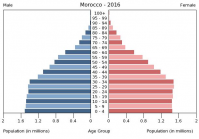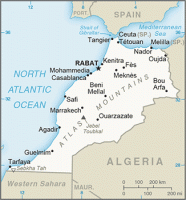|
|
|
|
Al Maghrib, the Arabic name for Morocco, means "far west" or "where the sun sets." When the Arabs first arrived in northern Africa in the seventh century A.D., Morocco was believed to be the westernmost point in the world. At that time, the Maghrib region included the countries that are today Morocco, Algeria, and Tunisia. The countries of the Maghrib share many common historical and cultural features. All have indigenous Berber populations and a strong Islamic base. Similarly, all were colonized by France, and remain largely bilingual, with both French and Arabic being spoken. Although European influence in Morocco is strong, it is still a country of distinctly Arabic tradition. The vast difference between the crude life on the streets and the hospitality and intimacy found in the home reflect the duality that is deeply ingrained in Moroccan culture. But one aspect of Moroccan life that is distinctly unified is religion. The king has declared that all citizens are born Sunni Muslims, and Islam is an important part of everyday ritual life. The Moroccan government is a constitutional monarchy, with a very powerful king. It is this mix of European and Arab influence, loyalty to the king and a strong Islamic base, that creates the uniquely Moroccan identity.
But there is a growing desire for religious freedom, especially among the Berber population, who are reacting against Arabization and some are going so far as to return to the historic Christian faith of their ancestors. Even the secular press in North Africa and Europe report that there are at least 40,000 believers in Morocco with more than 30 overt and covert churches attended by Moroccans. While most clearly do not attend church, both Christians and non-Christians believe there are tens of thousands who do not know other believers.
A woman asking for a New Testament in Spain spoke of her father having a book which he read every night until the day he died. He would not share it with his family saying it would get them in trouble. When he passed away they went to see what the book was. It was a "green New Testament" like those distributed at the ports. His copy was taken by a neighbor and burned. When she arrived in Spain she searched to have a New Testament like that of her father's.
|
|
|
|
|
Morocco is one of the world's few remaining monarchies. Its legal system is based on Islamic law and French and Spanish civil law. King Mohammed IV ascended the throne in 1999 following the death of his father Hassan II, and has instituted some reforms which have moved the country in better directions with respect to governmental transparency, international relations and personal freedom. Human rights grievances are being slowly settled. Notwithstanding this good news, King Mohammad has declared that everyone born in Morocco is Muslim, and that it is illegal for a Christian to "shake the confidence" of a professing Muslim. The king is also head of religion in Morocco, and claims to be descended from the "prophet" Muhammad.

Mohammed IV, King of Moroccco since July 30, 1999

Abdelilah Benkirane, President of the Government of Morocco since 2011
Morocco's bicameral Parliament consists of the Chamber of Advisors -120 seats; and the Chamber of Representatives 395 seats
Christian ministries operating
|
|
|
|
|
|
Freedom and opportunity in Morocco greatly favors males. Women largely remain in private and domestic service and are subject to harassment or ridicule in the streets. Men are usually the instigators of divorce proceedings, since it's very difficult for women to remarry and provide for herself. Prostitution is widespread. Polygamy is allowed but rare. Nevertheless, the Economist Intelligence Unit's published quality of life index recently ranked Morocco highest in Africa, although its ranking has now slipped behind Egypt but ahead of Angola. The economy is Africa's 5th largest and there has been steady growth since 2000, and King Mohammed IV is the wealthiest ruler in Africa.
Hepatitis A and B, intestinal parasites, and occasional outbreaks of cholera are all health problems in Morocco. HIV and AIDS are present and rapidly spreading. Both urban and rural areas suffer from a shortage of health-care centers, hospitals, and staff. Existing biomedical equipment is often inefficient or outdated. In 1987 a national vaccination project was launched with the goal of immunizing all children under one year of age and all women of procreating age. The Ministry of Health also launched the First Project of Social Priorities to set up health-care centers that would provide education in nutrition, hygiene, and birth control in the thirteen poorest provinces. In the late 1990s life expectancy at birth was seventy years for women and sixty-six for men. Morocco's health-care and life expectancy rates are the lowest in the three countries of the Maghrib, but higher than those of the sub-Saharan African countries to the south. [source]

WHO estimates show that "Behavioral" risks (like diet, tobacco & high blood pressure) are the leading causes of death in Morocco, as they are in the United States. Malnutrition is the leading cause in Sub-Saharan Africa.

The population graph for Morocco shows slightly steeper decline in population above age 35 than most Western countries, but not as dramatic as most African nations. The CIA Factbook estimates life expectancy at 76.9 years. Infant mortality rate is about 22.7 per 1,000 live births.

Morocco is in North Africa, between the North Atlantic Ocean and the Mediterranean Sea and between Algeria and Western Sahara
|
|
|
|
|
GMO's Stats on Morocco
In 2016, Global Media Outreach registered 4,304,814 gospel visits, 200,200 indicated decisions and 13,010 discipleship visits from Morocco.
“I have being in n out of God presence, n have realizes that my life is nothing without Christ. Can he stay accept me n save me from all I have done?”
—Nelson, Morocco (2017)
|
|
|
|
|
|
Member Prayer Requests/Praise Report from last week
Deborah: Family in Alaska are all sick
Alice: For the last month or so has had a recurrence of GERD. Saturday she fell from a ladder and cracked a rib.
|
|